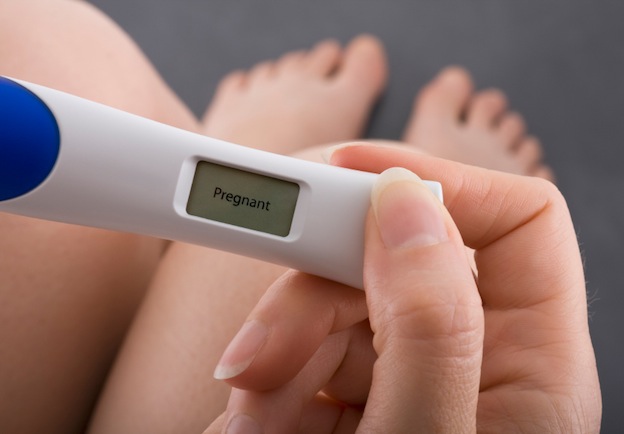SingaporeMotherhood | Pregnancy
September 2013
Are You Pregnant?

Trying to conceive and then waiting to know if you are indeed pregnant are nail-biting experiences for a woman. You may feel butterflies in your stomach, a sense of excitement and unease, fatigue, or even a sense of heaviness in your pelvic area.
Dr Chua Yang, director and specialist obstetrician and gynecologist in private practice explains why. “The premenstrual congestion you experience is similar to the increased congestion of blood supply in the pelvis to support pregnancy. Both result in bloatedness, crampiness and breast tenderness, adding confusion.” These pregnancy symptoms occur as your body adapts and prepares for its needs during pregnancy and breastfeeding. Hormonal changes trigger many pregnancy symptoms.
[banner][/banner]
The signs of pregnancy are described as possible, probable or positive signs. In the early days, an increasing number of signs occurring at the same time help you decide if you have conceived. What are these?
Signs of Implantation
These are the earliest signs of pregnancy, and may not be experienced by all women. When the embryo implants in the uterus, you may experience spotting known as ‘implantation bleeding’ or mild cramping, between six and 12 days after conception.
Breast changes
This includes enlargement of breasts, soreness, the nipple becoming more erect, the areola becoming darker in colour or veins becoming more prominent. These symptoms begin three to four weeks from the date of your last period.
The changes happen in preparation for breastfeeding. In your breast, the system of milk ducts expands and more milk-producing tissue begin to develop within your breasts. Even if these symptoms are absent, rest assured that you will be able to breastfeed.
Evangeline Toh, a mother of two, shares: “I usually have sore breasts just before my period. But this time, my breasts were extra tender! I was also breastfeeding my 21 month-old at that time, and breastfeeding was uncomfortable. I guessed I was pregnant then.”
Do
If you do feel any discomfort, wear a supportive bra, especially during activity or sport.
Fatigue
Pregnancy fatigue begins in early pregnancy and lasts through the first trimester. However, many women find renewed energy in the second trimester. This tiredness arises because your body is working hard to build your baby’s support system.
Do
Rest! Your tiredness is your body’s way of communicating its needs.
Do
Eat small meals regularly. If you are not already doing so, switch to a whole diet that consists of foods that are as close to their naturally occurring state as possible. Eating sugary foods may satisfy your pregnancy hunger pangs but they also cause fluctuating blood sugar levels, leading to mood swings.
Do
Build your support network. Seek help from close friends and family even if this means sharing your pregnancy news earlier than intended. If you’d rather remain anonymous, you can find a communities of mums-to-be to chat with at online forums such as SingaporeMotherhood!
Missed period
You may miss a period for many reasons other than pregnancy. Hormonal imbalances or emotional stress may also cause women to miss their periods. So a missed period is not always the best or the definitive method to confirm pregnancy.
Dr Chua Yang says, “I first see women who have regular periods around six weeks after their last menstrual period. But many women with irregular periods and with few early pregnancy symptoms may only recognise that they are pregnant much later in the first trimester.”
Nausea, vomiting and light-headedness
These may begin from six weeks into your pregnancy. Fluctuating hormone levels trigger morning sickness. Despite its name, nausea can hit anytime of the day. This typically subsides by the 16th week of pregnancy but may sometimes lasts right until birth.
“Certain smells such as tuna brought on waves of nausea and made my stomach churn. I became very sensitive to some smells or tastes. The trick was identifying what triggered my morning sickness and avoiding those,” says Evangeline Toh.
Do
Another way to cope with morning sickness is to have some crackers before getting out of bed in the mornings. Eat small, mini-meals throughout the day. Hot ginger or lemon tea helps some women. Different mothers find relief with different foods, so experiment until you find what works for you.
Frequent urination
This begins at about six weeks of gestation. It is caused by increased blood volume and more fluid being processed by your kidneys.
Spider veins
These may occur on your legs, your face or other parts of your body. They appear in a sunburst pattern or unconnected lines, and are caused when the increased volume of blood coursing through small blood vessels raises blood pressure within the vessels.
“With my third pregnancy, the blue streaks on my calf were my very first sign,” shares accountant Shiva Rai, a mother to three.
Do
Eat a fibre-rich diet to avoid constipation. Avoid prolonged periods of standing and crossing your legs while sitting, and elevate your feet where possible. Shiva Rai’s doctor suggested that she wear support stockings to prevent the spider veins from becoming varicose veins. “I think they helped. Wearing them was uncomfortable in this humid climate. But it was only for a few months in my life anyway!’”
Food cravings/aversions, & Constipation
The passage of food through your large intestine slows down to allow good absorption of nutrients, contributing to harder stools.
Do
Eat a fibre-rich diet and drink plenty of water. Eat smaller meals to avoid overloading your digestive system.
Feeling foetal movements, known as ‘quickening’
Although not a reliable sign, feeling those flutters is heartwarming for many new mothers! First-time mothers usually feel them at about 16 to twenty weeks of gestation. Mothers having a subsequent baby may be able to recognise the sensations earlier.
Enlargement of uterus, Braxton-Hicks practice contractions
From eight weeks of pregnancy, your uterus will start to enlarge. Braxton-Hicks contractions can be felt from 16 weeks onwards, though not every mother-to-be will feel them so early.
Urine & Blood Tests
According to Dr Chua Yang, urine and blood tests work by picking up secretion of
beta-hcG, either in the urine or blood. She says: “Beta-hcG is absent in blood before pregnancy but traces become detectable within a couple of days or pregnancy. Urine tests are likely to show a faint positive about 10 days after conception. They are unlikely to show a false positive result but may show a negative result even if you are already pregnant.”
Vaginal or Trans-abdominal Ultrasound scan
Dr Chua Yang explains, “A tiny water bag becomes visible by four and a half weeks of pregnancy on a good-quality vaginal ultrasound scan. Picking up very early pregnancy through a tran-sabdominal ultrasound scan is difficult if the mother is not thin, if she is constipated, or if she has a backward-tilting uterus. For most women, the pregnancy would be obvious by the time they reach about seven weeks of gestation.”
Fetal heart sounds by Doppler
These can be heard from eleven to 12 weeks of gestation.
Early-pregnancy symptoms may be uncomfortable at time. But they happen only because your body doing what it needs to in order to support the new life within you. So simply remember that, stay positive and embrace your pregnancy!
All content from this article, including images, cannot be reproduced without credits or written permission from SingaporeMotherhood.
Follow us on Facebook, Instagram, and Telegram for the latest article and promotion updates.






